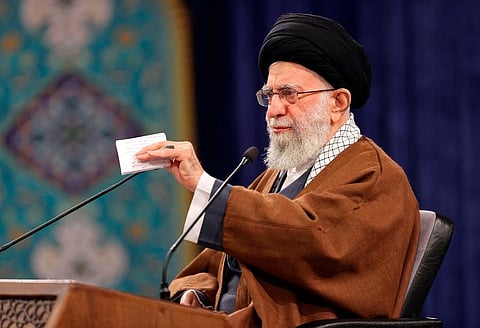

PARIS: Iran warned France on Wednesday of consequences after satirical magazine Charlie Hebdo published cartoons depicting supreme leader Ayatollah Ali Khamenei that Tehran deemed to be insulting.
The weekly had published dozens of cartoons ridiculing the highest religious and political figure in the Islamic republic as part of a competition it launched in December in support of the three-month-old protest movement.
"The insulting and indecent act of a French publication in publishing cartoons against the religious and political authority will not go without an effective and decisive response," tweeted Iran's Foreign Minister Hossein Amir-Abdollahian.
"We will not allow the French government to go beyond its bounds. They have definitely chosen the wrong path," he added, without spelling out the consequences.
Later on Wednesday, Iran's foreign ministry said it had summoned French ambassador Nicolas Roche.
"France has no right to insult the sanctities of other Muslim countries and nations under the pretext of freedom of expression," foreign ministry spokesman Nasser Kanani said.
"Iran is waiting for the French government's explanation and compensatory action in condemning the unacceptable behaviour of the French publication," he added.
Seen by supporters as a champion of freedom of speech and by critics as needlessly provocative, Charlie Hebdo's style is controversial even within France.
But the country was united in grief when in January 2015 it was targeted in a deadly attack by Islamist gunmen who claimed to be avenging the magazine's decision to publish cartoons of the prophet Mohammed.
'Not last word'
The issue contained a variety of sexual images depicting Khamenei and fellow clerics. Other cartoons pointed to the authorities' use of capital punishment as a tactic to quell the protests.
"It was a way to show our support for Iranian men and women who risk their lives to defend their freedom against the theocracy that has oppressed them since 1979," Charlie Hebdo's director Laurent Sourisseau, known as Riss, wrote in an editorial.
All the cartoons published "have the merit of defying the authority that the supposed supreme leader claims to be, as well as the cohort of his servants and other henchmen," he added.
Nathalie Loiseau, a French MEP and former minister loyal to President Emmanuel Macron, described Iran's response as an "interference attempt and threat" to Charlie Hebdo.
"Let it be perfectly clear: the repressive and theocratic regime in Tehran has nothing to teach France," she said.
In Washington, State Department spokesman Ned Price, asked about the row, told reporters that the United States stood "on the side of freedom of expression" whether "that's in France, whether that's in Iran, whether that's anywhere in between".
Khamenei, the successor of revolutionary leader Ayatollah Ruhollah Khomeini, is appointed for life. Above day-to-day politics, criticism of him is prohibited inside Iran.
Khomeini in 1989 famously issued a religious decree, or fatwa, ordering Muslims to kill the British author Salman Rushdie for what he deemed the blasphemous nature of "The Satanic Verses".
Many activists blamed Iran last year when the writer was stabbed at an event in New York but Tehran denied any link.
The Iranian regime has been shaken by three months of protests triggered by the September 16 death in custody of Mahsa Amini, an Iranian Kurd who was arrested for allegedly violating the country's strict dress code for women.
It has responded with a crackdown that Oslo-based group Iran Human Rights said has killed at least 476 people in protests, which Iranian officials generally describe as "riots".
Charlie Hebdo published the caricatures in a special edition to mark the anniversary of the deadly attack on its Paris office, which left 12 people dead, including some of its best known cartoonists.
"Eight years later, religious intolerance has not said its last word," its director said.
"It continues its work in defiance of international protests and respect for the most basic human rights."